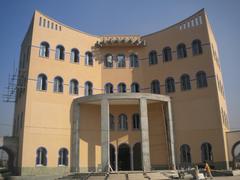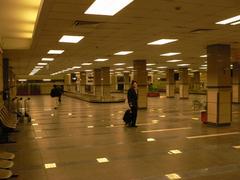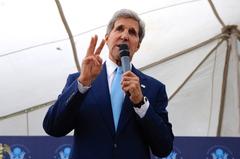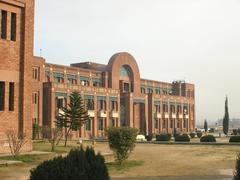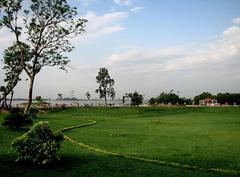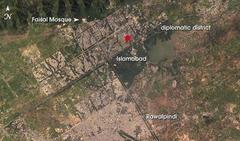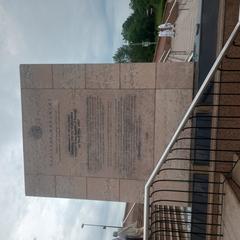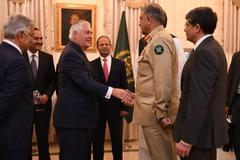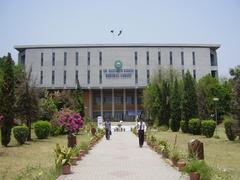Institute of Space Technology Islamabad Visiting Hours, Tickets, and Guide to Historical Sites
Date: 14/06/2025
Introduction
Nestled in Islamabad’s H-12 sector, the Institute of Space Technology (IST) is a testament to Pakistan’s progress in space science and technology. Established in 2002 under the Pakistan Space and Upper Atmosphere Research Commission (SUPARCO), IST has become a leader in aerospace education and research. Visitors—ranging from students and researchers to space enthusiasts and tourists—are welcomed to experience Pakistan’s pioneering achievements, such as the iCUBE-1 CubeSat and the iCube-Qamar lunar mission in partnership with China. With its modern campus, engaging guides, and regular public events like World Space Week and star-gazing nights, IST offers an immersive journey into the country’s advancements in space technology. This guide provides comprehensive details on visiting IST, including hours, ticketing, accessibility, nearby attractions, and essential travel tips to ensure a rewarding and educational experience. For the latest updates, refer to the official IST website and their social media channels. (Visiting the Institute of Space Technology Islamabad: Hours, Tours, and Significance)
Table of Contents
- Introduction
- About the Institute of Space Technology (IST)
- Visiting Hours and Ticket Information
- Campus Access and Directions
- Special Events and Exhibitions
- Nearby Attractions
- Significance and Achievements
- Visuals and Media
- Frequently Asked Questions (FAQ)
- Conclusion and Call to Action
About the Institute of Space Technology (IST)
Founded in 2002 under SUPARCO, IST is dedicated to advancing Pakistan’s expertise in aerospace engineering and satellite technology. The institute’s significant contributions include the launch of iCUBE-1, Pakistan’s first CubeSat, and the collaborative iCube-Qamar lunar mission with China. IST’s academic and research facilities are state-of-the-art, serving as a national hub for innovation in space science.
Visiting Hours and Ticket Information
- Visiting Hours: 9:00 AM – 5:00 PM, Monday to Saturday.
- Entry Fee: Free. Some areas, such as research labs and satellite centers, may require advance permission.
- Guided Tours: Available for educational groups and enthusiasts. Contact IST’s Public Relations Office in advance to schedule a tour.
Campus Access and Directions
- Location: Sector H-12, Islamabad.
- How to Reach: Easily accessible via Islamabad Expressway or Margalla Road. Ample on-campus parking is available.
- Accessibility: The campus is wheelchair-friendly with ramps, accessible restrooms, and support for visitors with disabilities.
Special Events and Exhibitions
IST organizes interactive events throughout the year, including World Space Week, sky-watch sessions, star-gazing nights, and science seminars. These events are open to the public and foster engagement with space sciences. For event schedules, visit the IST website or follow their social media pages.
Nearby Attractions
IST’s strategic location in Islamabad places it near several cultural and historical landmarks. Notable nearby attractions include:
- Pakistan Monument: A national heritage site symbolizing Pakistan’s unity.
- Lok Virsa Museum: Showcasing the nation’s diverse cultural heritage.
- Daman-e-Koh: A popular viewpoint with panoramic vistas of Islamabad.
Significance and Achievements
Pioneering Role in Pakistan’s Space Program
IST has played a foundational role in supporting Pakistan’s ambitions in aerospace and satellite technology. Its collaboration with SUPARCO has been vital for the country’s satellite design, launch, and operations.
Key Achievements in Space Technology
- Satellite Projects: iCUBE-1 (2013) and iCube-Qamar (2024) highlight IST’s technical prowess.
- Research & Education: Multidisciplinary programs in aerospace, remote sensing, GIS, and materials science.
- International Partnerships: Collaborations with institutions like Beihang University and the University of Surrey.
Societal Impact
IST’s research and satellite programs aid national priorities such as disaster management, urban planning, agriculture, and environmental monitoring.
Public Outreach and Scientific Literacy
Through events like World Space Week, IST inspires scientific curiosity and promotes STEM education among youth and the general public.
Recognition and Rankings
IST is ISO 9001:2015 certified, recognized by the Higher Education Commission of Pakistan, and consistently ranks among the country’s top engineering institutions.
Strategic Importance
The institute’s advancements in indigenous satellite technology enhance national security and contribute to critical infrastructure.
Future Prospects
IST is focusing on next-generation projects such as small satellites, reusable launch vehicles, and space-based internet services, consolidating its leadership in the regional space sector.
Visuals and Media
Prospective visitors can explore virtual tours and high-quality imagery of IST’s campus and projects on the official IST website.
Frequently Asked Questions (FAQ)
Q: What are IST’s visiting hours?
A: 9:00 AM – 5:00 PM, Monday to Saturday.
Q: Is there an entry fee?
A: No, entry is free for all visitors.
Q: Can I arrange a guided tour?
A: Yes, guided tours are available by appointment through the Public Relations Office.
Q: Is the campus accessible for disabled visitors?
A: Yes, IST provides ramps and accessible facilities.
Q: Are public events open to all?
A: Yes, events such as World Space Week and star-gazing nights are open to the public.
Conclusion and Call to Action
Visiting the Institute of Space Technology in Islamabad provides a rare opportunity to engage with Pakistan’s progress in space science and technology. With free entry, accessible facilities, and a vibrant calendar of events, IST is ideal for students, researchers, and tourists. Its proximity to iconic landmarks like the Pakistan Monument and Faisal Mosque makes it easy to incorporate into a comprehensive Islamabad itinerary.
To make the most of your visit, check IST’s official channels for the latest information on hours, tours, and events. Stay connected through social media and consider using travel apps for real-time updates. Discover the future of space technology in Pakistan’s capital and inspire your curiosity!
Internal Links
- Explore other scientific institutions in Islamabad
- Learn about Pakistan’s space missions and satellite programs
- Discover Islamabad’s top historical and cultural sites
External Links
Note: Please check for any COVID-19-related restrictions or updates before planning your visit.
Pakistan Monument: A Symbol of National Unity and Heritage
Located on the western Shakarparian Hills, the Pakistan Monument is one of the nation’s most iconic historical sites, representing Pakistan’s unity and cultural diversity. Its petal-shaped structure symbolizes the four provinces and three territories.
Visiting Hours and Ticket Information
- Hours: Open daily, 8:00 AM – 7:00 PM.
- Entry Fee: Free for all visitors.
Historical and Cultural Significance
Inaugurated in 2007, the monument commemorates the sacrifices made for Pakistan’s independence. The petals feature intricate motifs depicting the country’s diverse heritage, and the central mural illustrates pivotal moments in national history.
Guided Tours and Educational Programs
Guided tours provide insights into the monument’s symbolism and history. Educational workshops for students promote national awareness and cultural pride.
Travel Tips
- Best Time: Early mornings or late afternoons offer optimal lighting and cooler weather.
- Photography: Allowed in public areas; sunset photography is highly recommended.
- Accessibility: Fully accessible with ramps and paved paths.
- Nearby Sites: Pakistan Monument Museum, Shakarparian National Park, and Lok Virsa Museum are within close proximity.
Amenities
- Parking: Ample, near the entrance.
- Restrooms: Clean facilities available.
- Food: Cafes and vendors nearby.
Special Events
National celebrations, cultural festivals, and art exhibitions frequently take place at the monument. Check the official Islamabad tourism website for event updates.
Visitor FAQs
Q: Is there an entry fee?
A: No, entry is free.
Q: Are guided tours available?
A: Yes, they can be arranged onsite.
Q: Can I visit at night?
A: The monument closes at 7:00 PM.
Q: Is it suitable for children?
A: Yes, it is educational and family-friendly.
Getting There
Accessible via major roads, with public transport and ride-hailing services readily available. Signage clearly directs visitors to parking areas.
Additional Resources
For more information and the latest updates, visit the official Islamabad tourism website or contact the monument’s visitor center.
Faisal Mosque Islamabad: A Majestic Monument and Must-Visit Historical Site
Introduction
The Faisal Mosque, at the foot of Islamabad’s Margalla Hills, stands as an architectural marvel and a symbol of Pakistan’s spiritual and cultural identity. Once the largest mosque in the world, it welcomes millions annually for worship, sightseeing, and architectural study.

History and Cultural Significance
Commissioned by Saudi King Faisal bin Abdul Aziz and completed in 1986, the mosque was designed by Turkish architect Vedat Dalokay. Its tent-like design, without traditional domes, symbolizes simplicity and unity, and it serves as Pakistan’s national mosque.
Visitor Information
- Hours: 8:00 AM – 7:00 PM daily (with brief closures during prayer).
- Entry Fee: Free.
- Location: Northern end of Faisal Avenue, Islamabad.
- Accessibility: Ramps and facilities for wheelchair users; ample parking.
Travel Tips
- Dress modestly; women should cover their hair.
- Photography is permitted in exterior and courtyard areas but restricted inside.
- Visit early morning or late afternoon for the best experience.
- Guided tours may be available; inquire at the visitor center.
Nearby Attractions
- Margalla Hills National Park: Ideal for hiking.
- Pakistan Monument: Close and easily accessible.
- Lok Virsa Museum: Highlights Pakistan’s cultural diversity.
- Daman-e-Koh: Offers panoramic city views.
Special Events
- Eid Congregations: Large gatherings during Eid festivals.
- Ramadan: Special prayers and community iftars.
- Islamic Conferences: Occasional seminars on Islamic teachings.
FAQs
Q: Is there an entry fee?
A: No, entry is free.
Q: Can non-Muslims visit?
A: Non-Muslims are welcome in the courtyard and exterior; access to the prayer hall may be restricted.
Q: When is the best time to visit?
A: Early morning or late afternoon.
Q: Is photography allowed?
A: Permitted outside and in the courtyard, but not inside the main hall.
Q: Are guided tours available?
A: Sometimes; check with the visitor center.
Conclusion
The Faisal Mosque is a must-visit landmark, offering a blend of spiritual serenity, architectural splendor, and natural beauty. It is an essential stop for anyone exploring Islamabad’s historical and cultural sites.
Summary and Final Tips
Visiting the Institute of Space Technology allows you to engage directly with Pakistan’s achievements in space science and technology. With free entry, guided tours, and regular public events, IST is welcoming to all. Its location near other major sites like the Pakistan Monument and Faisal Mosque enables a comprehensive cultural and scientific exploration of Islamabad. For the best experience, consult IST’s official channels before your visit, and consider using travel apps for updates and virtual tours. Seize the opportunity to explore Pakistan’s scientific frontiers and cultural heritage in one memorable trip. (Institute of Space Technology Official Website | World Space Week)
References
- Visiting the Institute of Space Technology Islamabad: Hours, Tours, and Significance, 2025, IST Public Relations Office (https://www.ist.edu.pk/)
- Pakistan Monument: A Symbol of National Unity and Heritage, 2025, Islamabad Tourism Department
- Faisal Mosque Islamabad: A Majestic Monument and Must-Visit Historical Site, 2025, Islamabad Cultural Affairs
